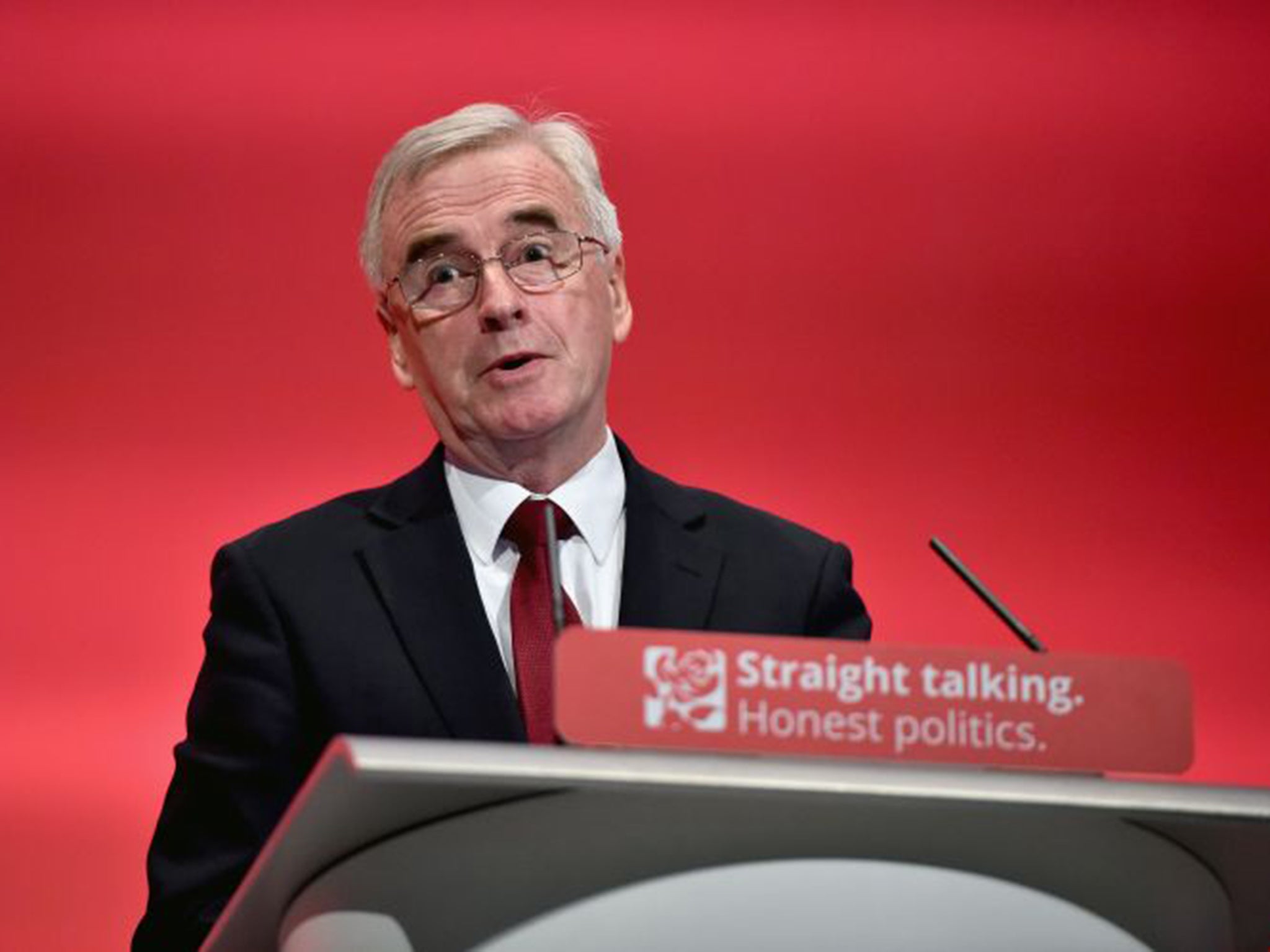Dressing up as a bank manager won’t help John McDonnell’s argument
Outlook: Mr McDonnell managed to sound quite reasonable in a speech light on policy but heavy on promises of consultation and conversation

He joked that he’d be boring, and he even managed to look a bit like the old-style bank manager that he promised his speech might have been made by (with a red tie of course): welcome to the attempt to turn scary neo-Marxist John McDonnell into a credible shadow Chancellor.
New Labour might have been more or less consigned to the dustbin of history, but its fondness for branding and PR seem to have survived it. Hence the spit and polish applied to Mr McDonnell who, having surrounded himself with lots of (more or less) eminent advisers, did indeed manage to sound quite reasonable in a speech light on policy but heavy on promises of consultation and conversation.
There was even a pledge to balance the books, albeit while getting rid of austerity at the same time. As for who will pay the extra taxes that will be required to get that done … well that’s where it starts to get a bit shaky. We’ve already heard corporation tax may go up, while for very high earners the 50 per cent top rate of tax will be restored. National insurance rates could be hiked to get rid of tuition fees.
But the really heavy lifting will apparently be done by the rotters who are avoiding paying much of anything at the moment – such as Amazon, Starbucks and, erm, Vodafone (which is spitting tacks about being accused of ducking tax and issued an angry statement). Boo!
The only problem here is that the Government Mr McDonnell opposes is already trying to target them (well, the former two anyway), and by going further than Labour ever did when it was in office, with its diverted profits tax. Among other things, we also had a promise to reverse the changes made by the Chancellor to inheritance tax, both sides of this debate having ignored the fact that the tax has long been optional for anyone with the services of a semi-competent accountant.
The responses from the business lobby to all this were understandably cautious.
But why not have a conversation? The economy is growing, but that doesn’t mean that there isn’t a debate to be had about what is going on within it, and about problems such as a grotesque and rising level of inequality, the alarming size of the UK’s trade deficit, its skills deficiency, the perennial problem with (weak) productivity and so on.
There is also room for some more imaginative policies to address that lot than those favoured by the current complacent consensus, with its tendency towards shrugging shoulders and leaving it to the market to sort it all out.
A look at the Bank of England’s mandate while we’re at it? Why not? As long as the promise to retain its independence is kept.
When all is said and done, what remains open to question is whether someone like Mr McDonnell, who has shown little apparent interest in the dry business of economic management in the past, is the right person to host the conversation he’s promising. And whether the conclusions he draws from it will convince a sceptical public. The fact that he’s put on a nice suit and tie won’t change that.
Forget the Schadenfreude over Glencore’s troubles
The prevailing view in the City is that Mr McDonnell has about as much chance of actually taking office as Glencore’s investors do of making back the money they’ve lost since buying into its controversial flotation by the end of the year.
The shares in the commodities giant have shrunk to record lows amid continuing concern about its financial health and its debt levels that a controversial (the company struggles to do anything without that C-word) $2.5bn (£1.6bn) share placing hasn’t done much to assuage.
Its latest woes were sparked by an Investec note suggesting that the shares might be worthless, while citing the need for major restructuring.
Time for a little Schadenfreude at the struggles of the company, and its billionaire founder Ivan Glasenberg? Perhaps not. Because many pension funds and Isas track the FTSE 100, they will be exposed to Glencore and they will suffer – the miner is so big that the fall in its shares knocked 2 per cent off the value of the FTSE 100.
However, the news is even worse for the people at the bottom of its sprawling operations, those who do the difficult, dirty and dangerous job of getting the commodities it trades out of the ground, often in places where the prospects of alternative employment are limited. Thousands of jobs are already due to go at two mothballed African mines as part of the company’s attempt to pep up the copper price. That requirement for restructuring means there may be worse to come.
Aldi to move online? I’ll drink to that
Aldi has been referred to as a discounter. It also gets called “no frills”. Those adjectives may be accurate, but there’s a slightly demeaning tone to them. The real reason for its success (and that of rival Lidl) is that it’s a superb retailer which has brought a new business model to these shores.
Now that model is going online, with wine and some of the special offers that fill what’s been nicknamed the “aisle of mad decisions”.
There’s no reason to think that Aldi won’t be as successful in that space as it has been with its stores. Just the announcement is probably enough to drive its competitors to drink.
Join our commenting forum
Join thought-provoking conversations, follow other Independent readers and see their replies
Comments